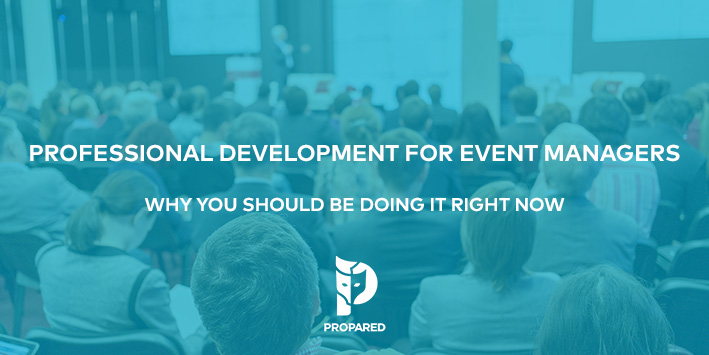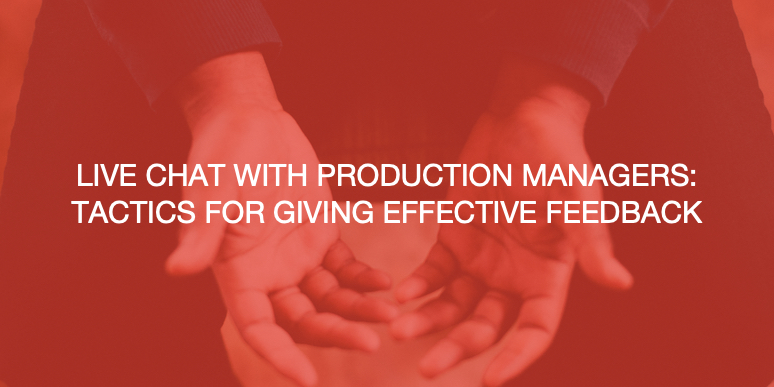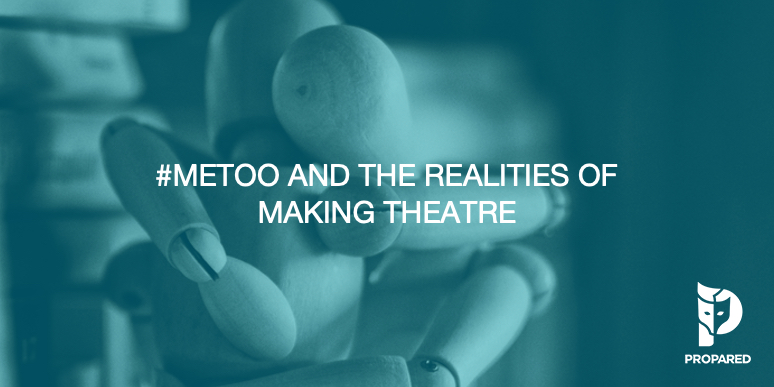
If you’re like most event managers, your training happens primarily on the job. You find mentors and you ask a lot of questions. Over time, you build up the experience to tackle more challenging work. Simple, right? At some level, every job in every industry does this.
However, there’s another part to professional development. It is structured, formal education, usually accredited or at the very least, recognized and respected. These classroom settings help to expand our knowledge of the increasingly diverse and technically complex events we have to produce. And in this regard, we event planners are behind the curve. To be fair, there are some terrific leaders and organizations out there working to change this reality. More on them later. First, let’s look at what professional development means for event planners, what you might be missing, and where you can find the resources to get it.
What Does Professional Development mean?
One definition of professional development is “the process of improving and increasing capabilities of staff through access to education and training opportunities in the workplace, through outside organization, or through watching others perform the job” (The Business Dictionary). Event managers need a varied and extensive skill set to succeed. You need to be creative and organized, possess solid interpersonal skills, and so on. If you work for a large event company, chances are you have access to more of these opportunities. What about the thousands of freelance event managers and small business owners out there? Where can they go for continued training?
Networking is Awesome, But it’s Not Training
We’re events people. So what do we do? We go to events. Trade shows, conferences, meet ups, panel discussions, and seminars. The event community is smaller than we think. There is always the possibility of securing a new client, meeting a mutual friend, or laying the groundwork for new business partnerships. Networking is vital to succeeding in this business. But it isn’t training. When networking, your energy is directed outward. Training forces you to direct your energy inward. You assess your own process, identify weak spots, and make improvements. Networking and Training: you need to do both and do them independently of each other.
What about “Planning?”
Stop me if this sounds familiar. You attend an educational session. You look at slides and videos of previous events. You listen as the speaker offers insight into engaging attendees, design concepts, and how to measure the return on an event’s investment. Maybe you learn about some new resources or tools to try out. All important. But do you ever find yourself thinking, “Right, but how did you actually get from A to E(vent) in the first place? How did you scope the project? How did you hire and contract crew and vendors? How did you send schedules and reports? And did you do it efficiently?”
Event planners go through hell to get to a point where the process seems effortless. Veterans among us will tell you it is anything but. Your planning process can have one of the single greatest effects on how you execute your event. So why not seek out training that focuses on this part of the work? Don’t just assume it will take care of itself. Learning how to be efficient takes practice.
Ok, Give Me Some Examples
Sometimes, the best training you can do is to seek out classes that give you insight into other people’s work. You don’t have to become an expert lighting designer. Maybe just learn a bit more about it so you can communicate better with your head electrician. Here are some ideas to get you thinking outside the box.
1. Electricity
What event doesn’t have lights? Take a class in basic electrical theory. The benefits are amazing. Learn how a light switch works, what’s inside a cable, and how to repair basic electrical units. It can not only help you troubleshoot problems but also make communicating with your designers and crew much easier. Anticipate their needs and foresee potential issues and roadblocks. If you currently operate under the assumption that you plug it in and it’ll turn on, an electrics class should be in your future.
2. Sound
What are the components that make up a speaker and a microphone? Why does a microphone pop or feedback? What does a sound mixing console do? Why shouldn’t you run sound and lighting off of the same power cables? These may seem like silly or simple questions but you’d be surprised how many professionals don’t know the basics. Make it part of your body of knowledge. You may not need to know the difference between an Audio Technica AT899 and an HMNSound MicroLav but show your A/V team that you’re invested in the hard work they do.
3. Rigging
Rigging is one of the most critical and important departments on an event site. It’s also often overlooked, despite it being quite dangerous. Major disasters happen because of rigging errors. Even understanding the basics of the forces at work in rigging elements can help. Know why and when you need to hire a professional rigger.
4. Math
An absolutely irreplaceable skill to possess. Thought you left it behind in high school? Think again. Almost every technical element of an event can be broken down using basic math concepts. Know how to calculate basic electrical equations involving watts, volts and amps. Learn the difference between single phase, three phase, neutral, and grounding. Your safety plans will hinge on your understanding of rigging breaking strength, forces and loads, dynamic loads, and bridling.
5. Safety
Speaking of being safe, if there is one thing you do this year, enroll in a safety course. First Aid, CPR, First Guard, Forklift, Boom Lift, Weather safety, or general procedures. It could literally mean the difference between life and death.
Make Training Part of Your Budget
Continuing education isn’t cheap. There may be trade offs you make in order to increase your expertise. Budget for it. Identify the classes and courses you want to attend and work it into your master schedule. Bring these opportunities to the attention of your superiors. If you can’t get some financial assistance to attend them, you are at the very least establishing a good precedent for your team.
Professional development takes effort and diligence. And it’s never done. Just when you feel you’ve got a handle on something, the parameters change. New technology emerges that completely upends your system. As long as you develop a plan, identify your learning goals, and hold to them, you’ll continue to grow as a professional.
Bonus: Resources Resources Resources!
Lest we forget! Below is a partial list (in alphabetical order) of organizations, associations, certifications, and general industry groups that provide excellent training resources for event professionals. Some are quite specific and targeted (A/V, meetings, rigging, etc.) and might be more than you want. Identify where you want to grow and use this list to move toward those goals. Good luck!
1. Organizations to Follow/Join
- Event Planners Association (http://eventplannersassociation.com/)
- IMEX (http://www.imexexhibitions.com/)
- Incentive, Business Travel and Meetings (http://inspire.ibtmevents.com/)
- InfoComm (http://www.infocomm.org/cps/rde/xchg/infocomm/hs.xsl/index.htm)
- International Association of Exhibitions and Events (http://www.iaee.com/)
- International Congress and Convention Association (http://www.iccaworld.com/)
- International Special Events Society (http://www.ises.com/)
- Meetings Professional International (http://www.mpiweb.org/)
- National Association for Catering and Events (http://www.nace.net/)
- Professional Convention Management Association (http://www.pcma.org/)
- The Special Event Show (http://www.thespecialeventshow.com/tse16/Public/enter.aspx)
2. Technical Classes
- United States Institute of Theatre Technology (http://www.usitt.org/eset/)
- Tomcat Rigging School (http://www.tomcatglobal.com/Training/)
- Live Design International Pro Training (http://www.ldishow.com/ldi16/Public/Content.aspx?ID=1063308&sortMenu=112002)
- Event Safety Alliance (https://eventsafetyalliance.org/training-certification-2/)
3. Advanced Specialty Certifications
- Certified in Exhibition Management (http://www.iaee.com/cem/)
- Certified Meeting Professional Program (http://www.conventionindustry.org/CMP/AboutCMP.aspx)
- Certified Professional in Catering and Events (http://www.nace.net/cpce)
- Certified Special Events Professional Program (http://www.ises.com/csep/home)
- Certified Technology Specialist Programs (http://www.infocomm.org/cps/rde/xchg/infocomm/hs.xsl/certification.htm)
- Entertainment Technician Certification Program (http://etcp.esta.org/index.php)
4. Other Industry Resources/Thought Leadership
- BizBash (http://www.bizbash.com/0
- Event Industry News (http://eventindustrynews.co.uk/)
- Event Manager Blog (http://www.eventmanagerblog.com/)
- The Meeting Pool (http://meetingpool.net/)
- PlannerWire (https://plannerwire.net/)
- TechsyTalk (http://techsytalk.com/)
- Tech Talk (http://www.corbinball.com/techtalk/)
- Velvet Chainsaw (http://velvetchainsaw.com/)
Event planners – do you have any resources, trainings, or groups that you swear by? Please share them with us!



